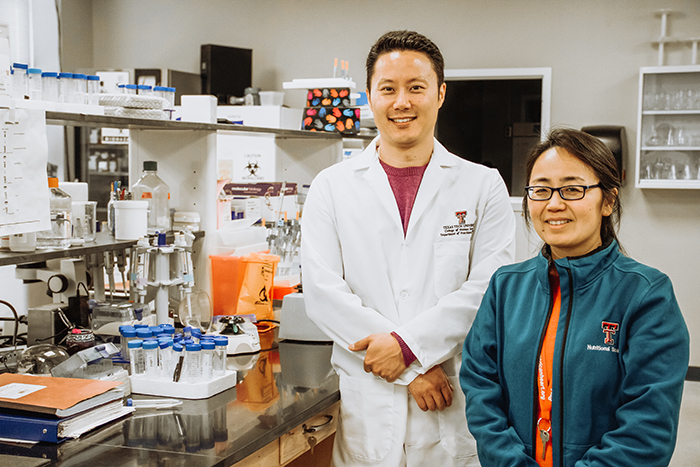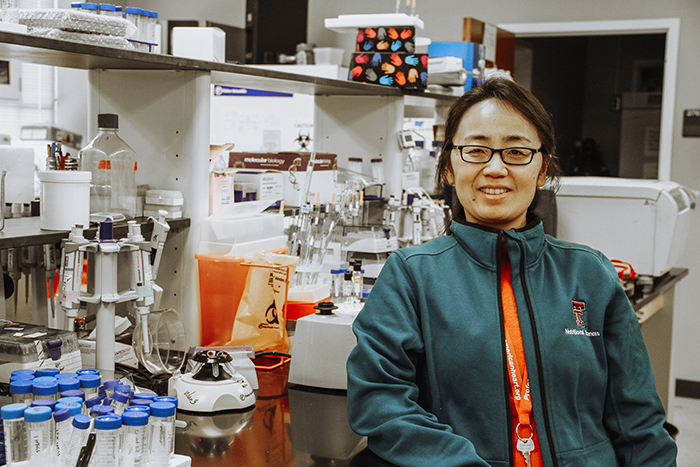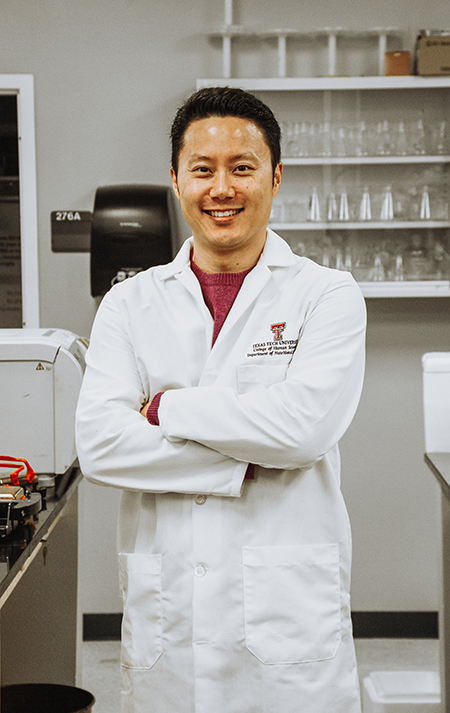Nutritional Sciences' Faculty Awarded 2017 TTU President's Collaborative Research Initiative

Nutritional Sciences' Shu Wang, Ph.D. and Andrew Shin, Ph.D. have been awarded the 2017 Texas Tech University's Presidents' Collaborative Research Initiative. The initiative aims to provide institutional support for collaborative research efforts that could go on to receive federal funding.
"The award significantly increases the visibility of the College of Human Sciences (COHS)," Dr. Wang said. "It is a prestigious award. I am so glad that my research has been recognized. It will help us in recruiting students and boosting our research."
Dr. Wang collaborated with Scott Shurmur, M.D. and Zhaoyang Fan, Ph.D. on the project titled, "Plaque targeted nano carriers for atherosclerosis diagnosis and treatment." The project has been chosen for institutional funding in the amount of $44,553.
Dr. Scott is a cardiologist at the Texas Tech University Health Sciences Center, and Dr. Fan is an associate professor in the department of Electrical and Computer Engineering who specializes in nano technology. Dr. Wang is a pioneer in using biocompatible and biodegradable nanocarriers to enhance the treatment of disease. Together they provide the expertise needed to create the nano carriers.
Dr. Wang's research is focused on the development of nanoparticles that target diseased tissues or cells for a more precise delivery of bioactive phytochemicals and other compounds. When used as carriers, nanoparticles can increase the success of phytochemicals and bioactive compounds in preventing, diagnosing, and treating diseases such as atherosclerosis, obesity, and cancer.
 "We use biochemical, molecular biological, and biotechnological approaches to conduct
our research. We use animal and human samples to investigate the research hypotheses."
"We use biochemical, molecular biological, and biotechnological approaches to conduct
our research. We use animal and human samples to investigate the research hypotheses."
When Dr. Wang arrived at Texas Tech University she wanted to open a new area of research in nanomedicine and nutrition. Dr. Wang's Nutrition and Nanomedicine Lab uses biochemical, molecular biological, and biotechnological approaches to conduct research. Her lab creates the nanoparticles, and then uses the animal and human samples to investigate the nanoparticle's effectiveness in treating chronic diseases.
"Our long-term goal is to use cutting-edge nanomedicine techniques to enhance bioactivities of phytochemicals for the prevention and treatment of chronic diseases, especially cardiovascular disease and obesity."
 Dr. Shin collaborated with Mohammad Ansari, M.D. from the Texas Tech University Health
Sciences Center on his research project titled, "A new culprit for heart failure:
Control of BCAA metabolism in cardiac function." The research focuses on the buildup
of branch chain amino acids (BCAA) in people who have suffered heart failure. Dr.
Shin hopes to find bio-markers that would allow for early screening, detection, and
execution of behavioral and/or pharmacological interventions that could help treat
or prevent the progression of heart failure.
Dr. Shin collaborated with Mohammad Ansari, M.D. from the Texas Tech University Health
Sciences Center on his research project titled, "A new culprit for heart failure:
Control of BCAA metabolism in cardiac function." The research focuses on the buildup
of branch chain amino acids (BCAA) in people who have suffered heart failure. Dr.
Shin hopes to find bio-markers that would allow for early screening, detection, and
execution of behavioral and/or pharmacological interventions that could help treat
or prevent the progression of heart failure.
To do this, Dr. Shin's study is going to help develop a better understanding of cardiac BCAA regulatory pathways and investigate the roll of insulin on regulating BCAA metabolism. Cardiologist Dr. Ansari can provide expertise on the functions of the heart, and more specifically heart failure.
"I hope they find it very innovative, to the novel concept that, 'oh this guy actually investigated the roll of insulin on regulating BCAA metabolism, wow that's something they never thought of, but it makes sense.'"
Dr. Shin said that it's very honorable to have received this award. Dr. Shin explains that it is difficult to start research at a new institution, so the fact that he was able to obtain an award for his research within his first year is promising. Dr. Shin hopes his study generates significant results so that he can apply for larger grants from federal agencies, and collaborate with other researchers to answer larger questions.
"At the end, I think we are all doing this for improving health," Dr. Shin said. "Hopefully this will result in bigger ideas and more collaborations between different investigators to answer really important questions."
Congratulations to Dr. Wang and Dr. Shin for being awarded the 2017 Texas Tech University's Presidents' Collaborative Research Initiative.
College of Human Sciences
-
Address
College of Human Sciences, Texas Tech University, P.O. Box 41162, Lubbock, TX 79409-1162 -
Phone
(806) 742-3031 -
Email
hs.webmaster@ttu.edu
